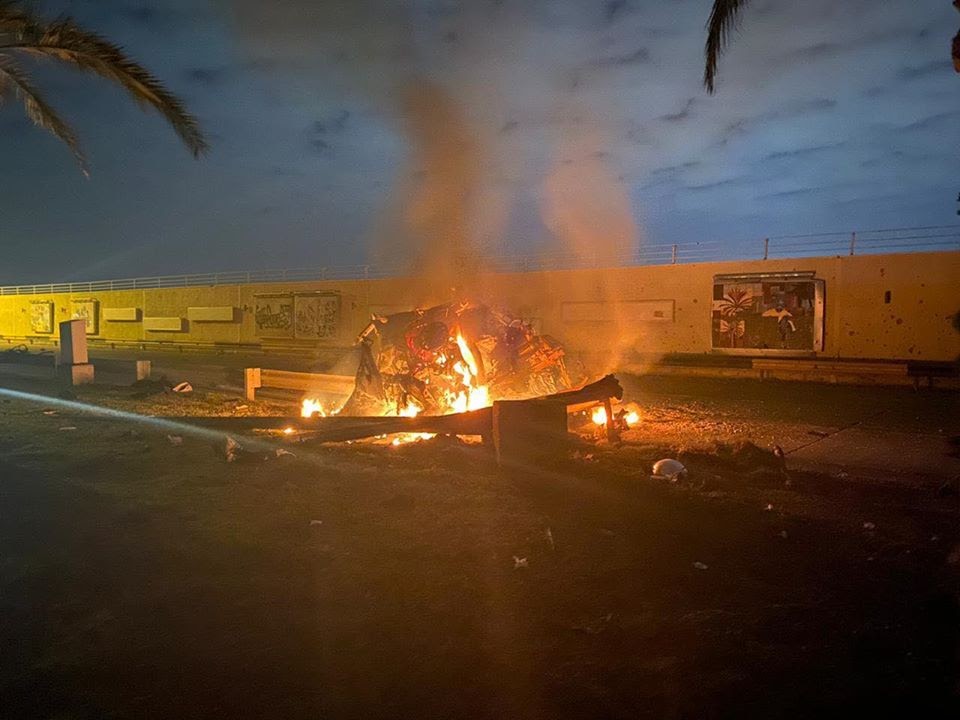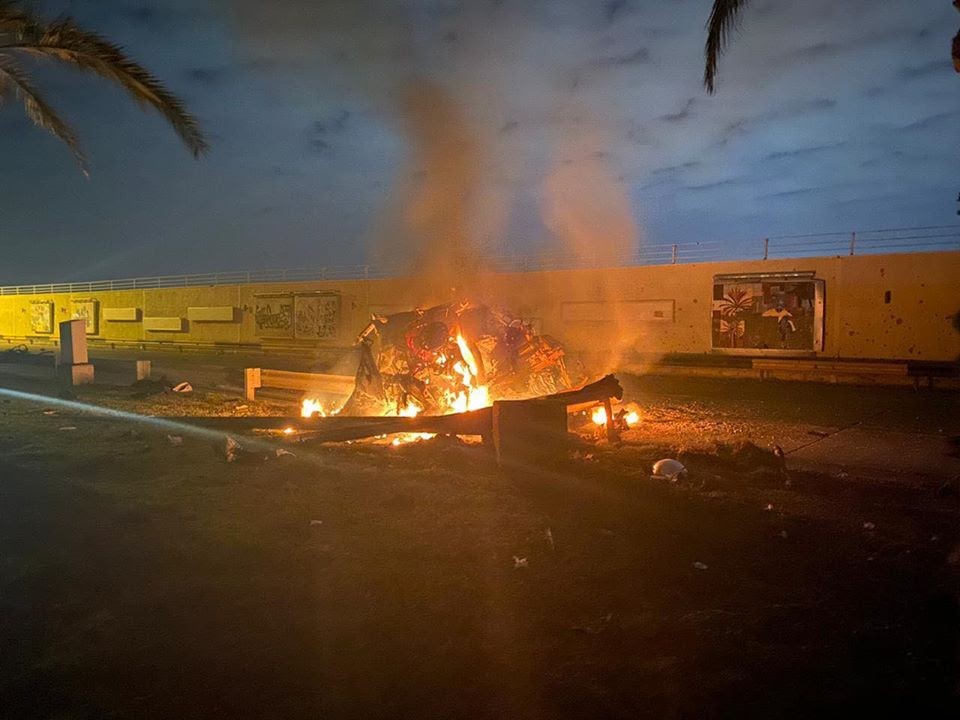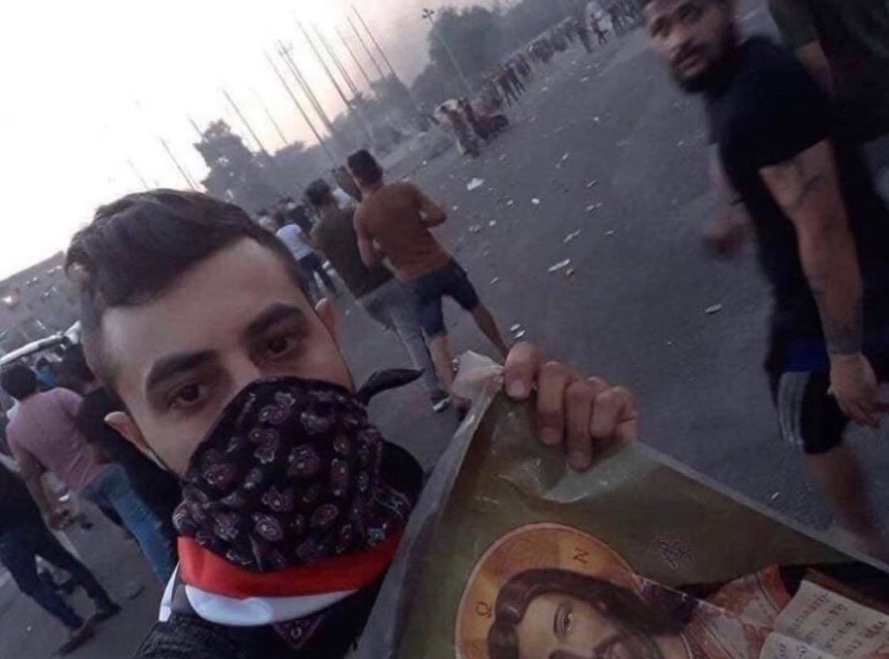
BREAKING: Assassinations in Iraq
A US drone strike killed two top Iranian and Iraqi military commanders in Baghdad, dramatically escalating tensions across the region. Preemptive Love’s Iraq-based staff members Erin Wilson and Ihsan Ibraheem discuss the assassinations and what might come next.
Share this episode
Show Notes
On Friday, a US drone strike killed two top Iranian and Iraqi military commanders in Baghdad, dramatically escalating tensions across the region. What happens next is anyone’s guess.

In this breaking episode, Iraq-based team members Erin Wilson and Ihsan Ibraheem sat down to discuss the assassinations, the reactions to them, and what could come next.
Quotes from this episode:
“It’s easier to fight outside your country than bringing war to your country. We don’t need to imagine it. We live in it. We are in the middle of it. We see how war is devastating to everyone, even those who are not touched by it.”
— Ihsan Ibraheem
“The majority of Iraqis are just tired of war. It feels like it never ends now. Every time we see, every time we dream or hope for peace, something comes and destroys that. People want [peace.] They see that as the hope for the future. Maybe not for us, maybe for our children. But it’s achievable if we want to.”
— Ihsan Ibraheem
We will continue serving those affected by war in Iraq, Syria, and beyond. Join us.
Additional Resources
Full Transcript
Ihsan: This is very sad actually, because you are you are doing this and the people in Iraq are having all the damage.The people here will lose their lives. The people here will lose their jobs. The people here will lose their beloved ones.
Ben: It’s Saturday, January 4, and it’s the day after a US drone strike killed top Iranian and Iraqi officials in Baghdad. I’m Ben Irwin, and this is Love Anyway, a podcast by Preemptive Love. Iranian military commander Qasem Soleimani and Abu Mahdi al-Muhandis, leader of Iraq’s state-sponsored militia, were both killed, along with at least two others, as they drove from Baghdad’s airport. The assassination sent shockwaves around the world. No one knows what will happen next. Whether it could bring the US and Iran closer to war, what it could mean for the presence of US officials, US troops, and US interests in Iraq. Or how it could affect the wider region, with the fallout reaching potentially as far as Syria, Lebanon, or Yemen.
My colleagues in Iraq, Erin Wilson and Ihsan Ibraheem, sat down to discuss the assassination and its aftermath. We’re sharing their conversation to give you as close to an on-the-ground perspective as possible…
Erin: Good morning, Ihsan.
Ihsan: Good morning.
Erin: It was a rough way to wake up this morning.
Ihsan: Yeah. Very rough. Shocking, actually.
Erin: So how did you wake up this morning?
Ihsan: I started receiving messages from my brother. He lives in Sweden. And then I woke up to see all of this like having about like 30 minutes of when the first news came.
Ihsan: The Iranian guy is considered one of the most important and influential persons, like, in the whole region. He’s the head and the leader of the Quds army. And he’s, like the mastermind, someone, some people call the mastermind of everything in Iraq, Syria, Yemen, all of this, especially militias, planning, strategy.
Erin: So what was his connection to the war against ISIS?
Ihsan: He was one of the key leaders…
Ben: Soleimani was, in fact, one of the most important figures in the war against ISIS in Iraq, leading the militias that played an instrumental role in taking back territory.
Ihsan: He had a very strong influence, especially during their first wave, when ISIS came and controlling a major part of Iraq. So he considered by many Iraqis, including some politicians or the government, one of the people who credited for the victory against ISIS.
Erin: And now they’re they’re Iran backed militias are also involved in Syria. The Iran-backed militias are in support of the government there.
Ihsan: The way they think, when they went to Syria to fight is: this is like a religious kind of war. It’s not about keeping Bashar Al Assad in power, but because you will have otherwise extremist group controlling, like al Qaeda, Nusra, like ISIS, controlling this region and bring like war and fire to all the place not just in Syria, actually—everyone will be in this. They believe that to prevent the danger in Syria better than bring it to Iraq and fight it.
Erin: So much in the same way that the United States has soldiers all around the world to fight and protect American interests before war comes to the United States, Iran essentially is doing the same thing. They are involving themselves in, in wars outside their country so that the violence does not come to their borders.
Ihsan: And it’s easier. It’s easier to fight in outside your country than bringing the world your country you know, imagine I mean, Iraq now. We don’t need imagine we live in we we are in the middle of it. So we see how war is devastating to everyone, not even those who are not touched by it. To have this war, like what’s happening now between Iran and the United States and the field is Iraq—is, is less damaging to those countries. So Iraq is just a field to settle all of those disagreements And this is very sad actually, because you are you are doing this and the people in Iraq are having all the damage. No one else Well, I mean, you you spend money you spend you know, hundreds of millions or billions of dollars on on these wars, but you are. I mean, place intact.
Ihsan: The people here will lose their lives. The people here will lose their jobs. The people here will lose their beloved ones. So this is the thing. It’s, it’s easier to fight by proxy and I think it’s everywhere now. You know that because you see it happening in Libya. You see it happening in Syria. I see it happening in Yemen.
Erin: So this morning, we’ve been watching closely what reactions would be across Iraq and this area. Can you tell me some of those? Some of those reactions? Maybe first start with them with Sadr?
Ben: Muqtada al-Sadr is an important Shia cleric and power broker in Iraq.
Ihsan: He condemned the attack. And he sent his condolences to the Grand Ayatollah in Iran and then he, he said, the Mahdi army, which has been freezed for all these years.
Erin: That’s his army, his army. Yeah,
Ihsan: This is this is the army that fought the United States for, since 2003 to 2010 I think when he started when he first freezed them. And then now we are in 2020, and he As he said in his tweet that he called for a full mobilization for for the Mahdi army to be ready to protect Iraq. So, this this is a very serious development.
Erin: What did we hear from the Iraq government?
Ihsan: The Prime Minister of Iraq, issued a press release he said, We are condemning condemning this attack, and this is a violation to Iraqi sovereignty, dignity and security. The agreement that had been signed with the United States—the agreement says that the United States cannot perform attacks in Iraq soil, they are here for training Iraqi forces, and this is the main reason of their visits.
Erin: Now there was one important voice that we were waiting to hear from this morning.
Ihsan: The grand Ayatollah, the religious leader for all Shia in Iraq. He’s the first most important person in all Iraq he said there was a very difficult and unfortunate and dangerous days, the last several days—to today’s serious and dangerous events by killing and assassinating the two heroes of the victory against ISIS.
Erin: Now, this is how he referred to them.
Ihsan: This is how exactly he referred to them: the heroes of the victory against ISIS. He started praying to God, and he asked for everyone to [show] self control and wisdom and in their actions.
Ihsan: Yeah, and that was very much the khutbah, the speech, and it will be heard by some that he tried to prevent more bloodshed in Iraq. Tried to prevent more war. Especially, this is a war in proxy. You know, it’s not like the United States have a war in Iraq or against the Iraqis, or Iran has a war against Iraq. It’s like the two nations are trying to make a war, if it’s not now—we are at war actually, in Iraq. But they have this kind of disagreement or kind of thing, and, well, let’s choose a map. And certainly, it’s like we are in the middle with Iraq is the map for this war.
Erin: So this is all still a developing very much a developing situation. What’s your best advice for people in the next in the next few days as things start to unfold and all kinds of stories and speculation are flying around online?
Ihsan: Well, self control is the one that I think is the key player in this situation. Because once you escalate this to something else, you have no control anymore. And I feel like we all now have no control on things that keep going, you know, keep happening. We saw it like in just seven days, there was an attack on a base in Kirkuk that led to one US civilian killed, one contractor killed. Then just in the next days, there is an attack on a base for Hash’d. Then the next day there was a storm on the US Embassy in Baghdad. And now we have those two, one of the most important and key players in all these situation in the region. So anything else like will add to it, it’s just we’ll keep this fuel this and keep it going to something that may be going back, like war.
Erin: We can’t know what’s ahead. But there’s one thing we do know. Absolutely we know is that Iraqis want peace.
Ihsan: Definitely. The majority of Iraqis is just tired for lack this word words here is just It feels like it’s never ends now. It feels every time we see every time we dream, or hope for peace, something comes and destroy that or something just blurred everything and make it very difficult to see. And definitely people every time every time they were in war, the see how devastating this war how awful this war and hope, dream or try hard to to bring peace like those protests in Baghdad that have been there for three months now
Erin: In downtown, in Tahrir Square.
Ihsan: In Tahrir Square. They are both esteemed for taking all the influence that Iran would in Iraq, take out corruption, bring peace bring prosperity to the country. People want that. See that as the hope for the future. Maybe not for us, maybe for our children, but it’s achievable if we want to.
Erin: Thank you, Ihsan.
Ihsan: Thank you, Erin.
Ben: Thank you for listening. We’ll continue to share more from Iraq as the situation develops. You can follow us @preemptivelove on Facebook, Twitter, and Instagram. To support our work providing relief and jobs to mend the wounds of war in places like Iraq, go to preemptivelove.org.


